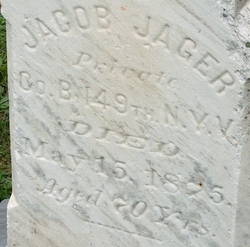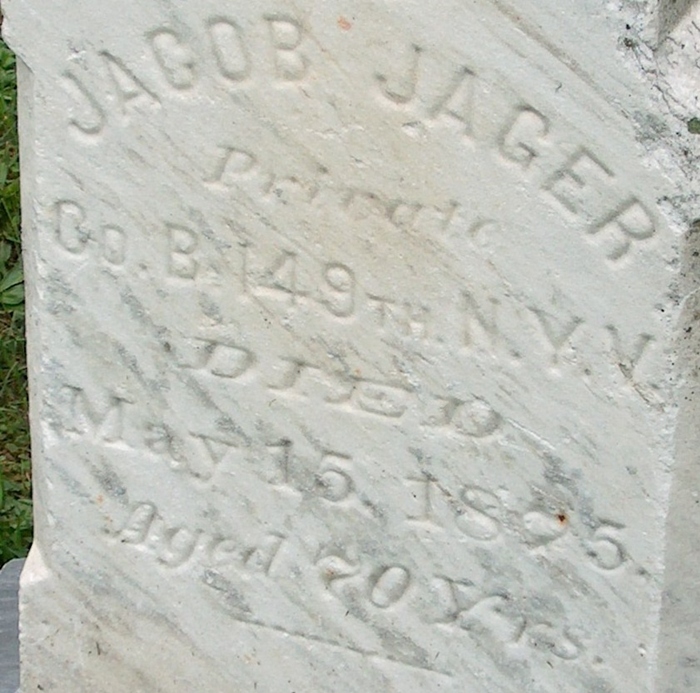History Preserved at Grave
Civil War soldier's marker is returned to Syracuse cemetery
By Gloria Wright, Staff Writer
No one knows what kind of service marked 70 year old Jacob Jaeger's burial in 1875. But the rededication of his tombstone Sunday took place under a bright blue sky to the sounds of a fife-and-drum corps, two German choruses and the gentle slapping of flags tossed by the wind.
Jaeger "was an ordinary man who lived an ordinary life," said the keynote speaker, Joanne Arany, a National Park Service historic preservationist. It is the ordinary people who built this country and served in its wars, she said.
"This stone is a monument to them all..." she said. "This stone reminds us this was and is a cemetery. We can't forget the sanctity of this place."
Gary Slate of Baldwinsville, a member of the 149th New York Volunteer Infantry Skirmish Club, laid a wreath on Jaeger's reset stone. As taps was played, Slate, dressed in a Civil War uniform, saluted.
About 35 people attended the observance by the skirmish club, an affiliate of the North-South Skirmish Association.
"The importance of this stone is largely symbolic..." the program says. "It is a reminder of the old north side German neighborhood, which is still remembered, is still influencing Syracuse and is still connecting with time-honored traditions."
Jaeger and his wife, Mary, emigrated from Germany to Syracuse, where he worked as a salt packer. When the Civil War began, Jaeger was 57. He lied and gave his age as 42, apparently to get by the recruiter. In September 1862, he enlisted with the all German Company B of the 149th New York Volunteer Infantry.
Jaeger served until the end of the Civil War, came home and died 10 years later. He was buried in Rose Hill Cemetery on the North Side. In 1935, the cemetery was closed. Monuments were smashed and stolen by vandals and later knocked over and buried by the city.
Little else is known about Jaeger's life, except that his tombstone was found in a driveway in Eastwood in 1981.
No one knows how it got there. For two years, the stone was in the Syracuse Police Department's lost-and-found division. Then it went to the Jordan home of Bill Doner, a Civil War buff. Doner was unable to trace the tombstone. When he moved in 1995, he turned it over to Slate.
With the help of Arany, Bernard Straub of the Rose Hill Park Association and Judy Haven of the Onondaga Historical Association, Jaeger's plot was found.
"It's nice to have it done," Slate said. "What was really nice was the overlapping interests who were here, people who are interested in the Civil War, German people and preservation people."
The Post Standard (Syracuse, NY), 27 Sept 1999
*Thank you to Tammy for providing this article
History Preserved at Grave
Civil War soldier's marker is returned to Syracuse cemetery
By Gloria Wright, Staff Writer
No one knows what kind of service marked 70 year old Jacob Jaeger's burial in 1875. But the rededication of his tombstone Sunday took place under a bright blue sky to the sounds of a fife-and-drum corps, two German choruses and the gentle slapping of flags tossed by the wind.
Jaeger "was an ordinary man who lived an ordinary life," said the keynote speaker, Joanne Arany, a National Park Service historic preservationist. It is the ordinary people who built this country and served in its wars, she said.
"This stone is a monument to them all..." she said. "This stone reminds us this was and is a cemetery. We can't forget the sanctity of this place."
Gary Slate of Baldwinsville, a member of the 149th New York Volunteer Infantry Skirmish Club, laid a wreath on Jaeger's reset stone. As taps was played, Slate, dressed in a Civil War uniform, saluted.
About 35 people attended the observance by the skirmish club, an affiliate of the North-South Skirmish Association.
"The importance of this stone is largely symbolic..." the program says. "It is a reminder of the old north side German neighborhood, which is still remembered, is still influencing Syracuse and is still connecting with time-honored traditions."
Jaeger and his wife, Mary, emigrated from Germany to Syracuse, where he worked as a salt packer. When the Civil War began, Jaeger was 57. He lied and gave his age as 42, apparently to get by the recruiter. In September 1862, he enlisted with the all German Company B of the 149th New York Volunteer Infantry.
Jaeger served until the end of the Civil War, came home and died 10 years later. He was buried in Rose Hill Cemetery on the North Side. In 1935, the cemetery was closed. Monuments were smashed and stolen by vandals and later knocked over and buried by the city.
Little else is known about Jaeger's life, except that his tombstone was found in a driveway in Eastwood in 1981.
No one knows how it got there. For two years, the stone was in the Syracuse Police Department's lost-and-found division. Then it went to the Jordan home of Bill Doner, a Civil War buff. Doner was unable to trace the tombstone. When he moved in 1995, he turned it over to Slate.
With the help of Arany, Bernard Straub of the Rose Hill Park Association and Judy Haven of the Onondaga Historical Association, Jaeger's plot was found.
"It's nice to have it done," Slate said. "What was really nice was the overlapping interests who were here, people who are interested in the Civil War, German people and preservation people."
The Post Standard (Syracuse, NY), 27 Sept 1999
*Thank you to Tammy for providing this article
Advertisement
Explore more
Sponsored by Ancestry
Advertisement



